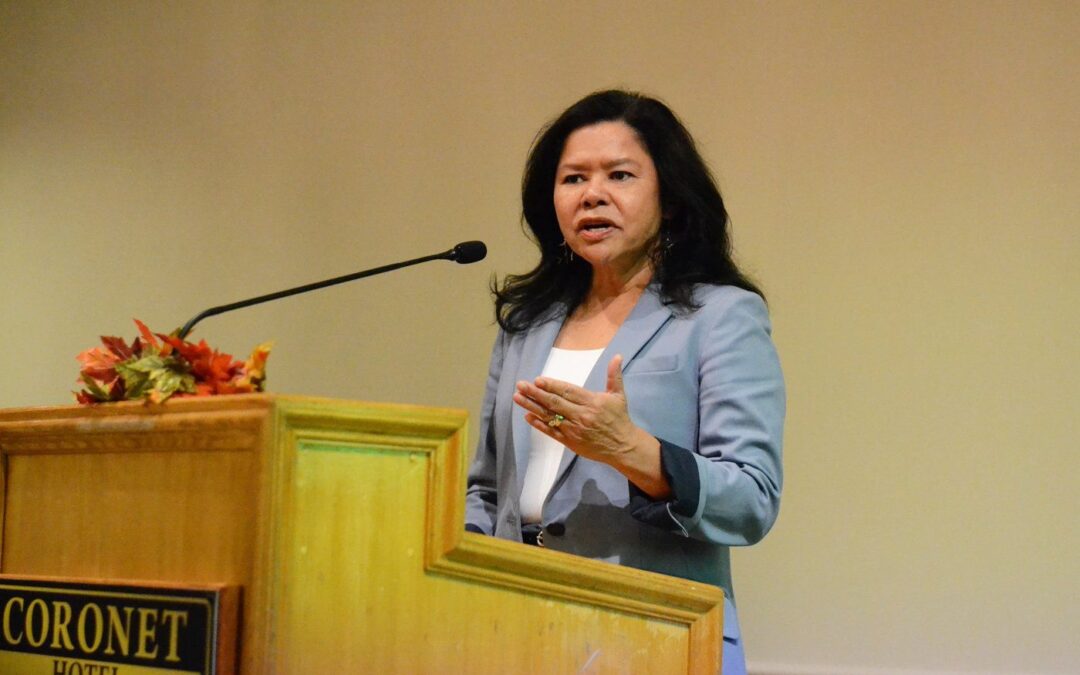FNUC President Jacqueline Ottmann speaks at the Coronet Hotel in Prince Albert on Sept. 21, 2023. Jayda Taylor, Local Journalism Initiative Reporter
By: Jayda Taylor, Local Journalism Initiative Reporter, Prince Albert Daily Herald
Prince Albert’s new First Nations university campus is set for shovels to hit the ground, pending significant funding approval.
The First Nations University of Canada (FNUC) has been waiting for a few months to hear back about a $25 million grant from Infrastructure Canada. This would fund almost half of the roughly $55 million build, according to President Jacqueline Ottmann.
She said the upgrade would bring the campus’ student capacity up from about 300 students to 450.
“That is significant growth for us and the building is also designed to host community events,” she said.
“In the facility that we’re in right now, that can’t happen. We just don’t have the space there,” she said.
The current FNUC campus in the city is located downtown on Central Avenue. In January, city council approved a proposal to build on five acres of land near the Alfred Jenkins Field House for a nominal one dollar fee.
“It’s a strong demonstration of economic reconciliation and partnering for the benefit of all people,” said Ottmann.
If the funding from Infrastructure Canada is approved, which would come from the Green and Inclusive Community Buildings Program, Ottmann said construction can begin “almost immediately.” Then, FNUC has a two-year timeline to complete the project.
FNUC has already secured an $8.5 million mortgage, and is in the midst of a $5.5 million campaign. Ottmann said a million dollars of that campaign will be covered with the federal government’s approval.
She said the location is ideal for their student demographic, which is primarily women, many who are single parents.
“That location made sense for a future campus because you’re looking for holistic supports. At that location, we have pathways, walking pathways, there’s a field house, there’s a playground, then there’s the hospital,” she said.
Student registration for the Fall 2023 semester showed 46 per cent of FNUC students are pursuing Indigenous social work, followed by 26 per cent in the arts.
Ottmann said many social work graduates move on to become therapists.
“There is that connection that I think we can strengthen with the hospital,” she said.
Ultimately, explained Ottmann, FNUC prioritized a new and improved campus in Prince Albert because it hosts students from across northern Saskatchewan.
“What we recognize, and we talk about this and learned about this, is that many people from the north don’t want to go any further south than Prince Albert,” she said.
“(We have) to uplift our Indigenous youth and non-Indigenous youth and to ensure that they’re not only recruited within our institutions, but they are retained to program completion.”
Ottmann spoke at a Prince Albert Chamber of Commerce luncheon at the Coronet Hotel on Thursday. Her speech ranged from an early story of “persistence and determination” to today’s growth in fostering Indigenous education.
“All of our graduates, when they get their degree, all the sudden those doors open,” she said.
That desire to pursue further education trickles into future generations.
“I was one of the first to graduate from my community, and that was celebrated in my family, and I marked that moment by wearing a white buckskin dress at my high school graduation – the scariest thing that I had done up until that point,” recalled Ottmann.
“But it was more for kind of communicating that I won’t compromise who I am, but also inspire the youth in my community.”
Ottmann is from the Saulteaux community of Fishing Lake First Nation near Wadena.
She said FNUC works to bridge elementary, to high school, to post-secondary education, and into the workforce. Staff often travel to First Nation communities and rural areas not just to promote the university, but to demonstrate the opportunities available beyond a high school education.
